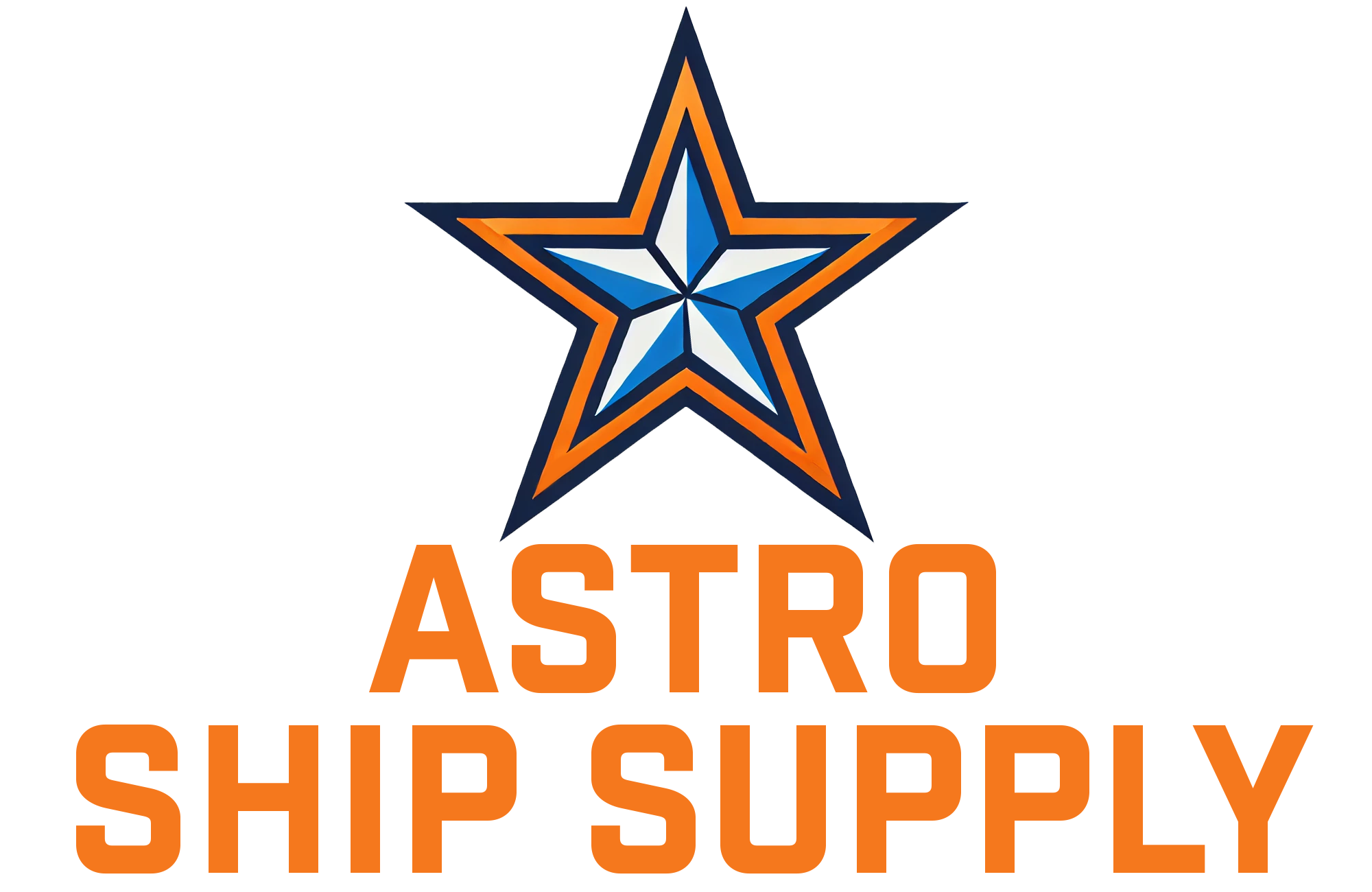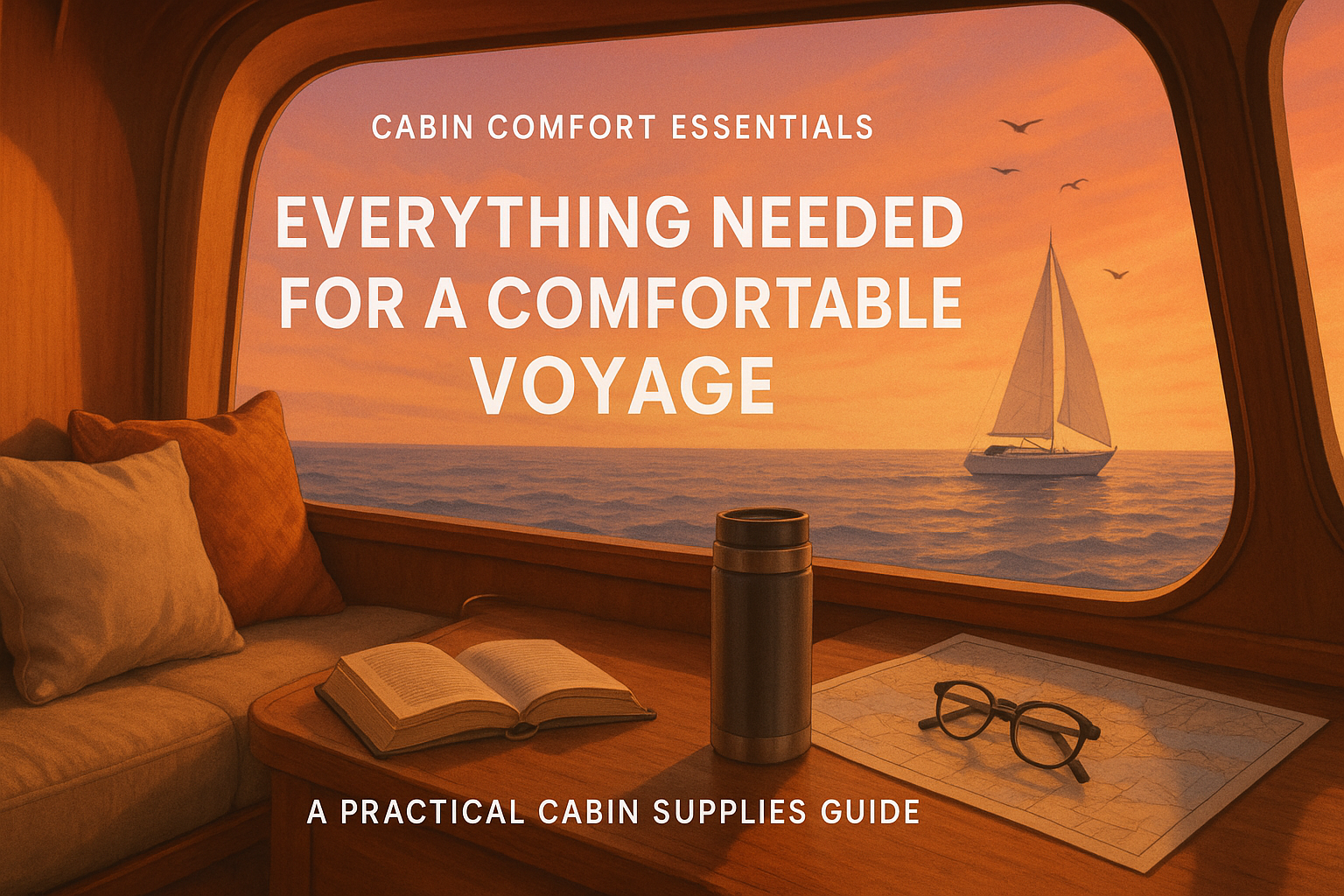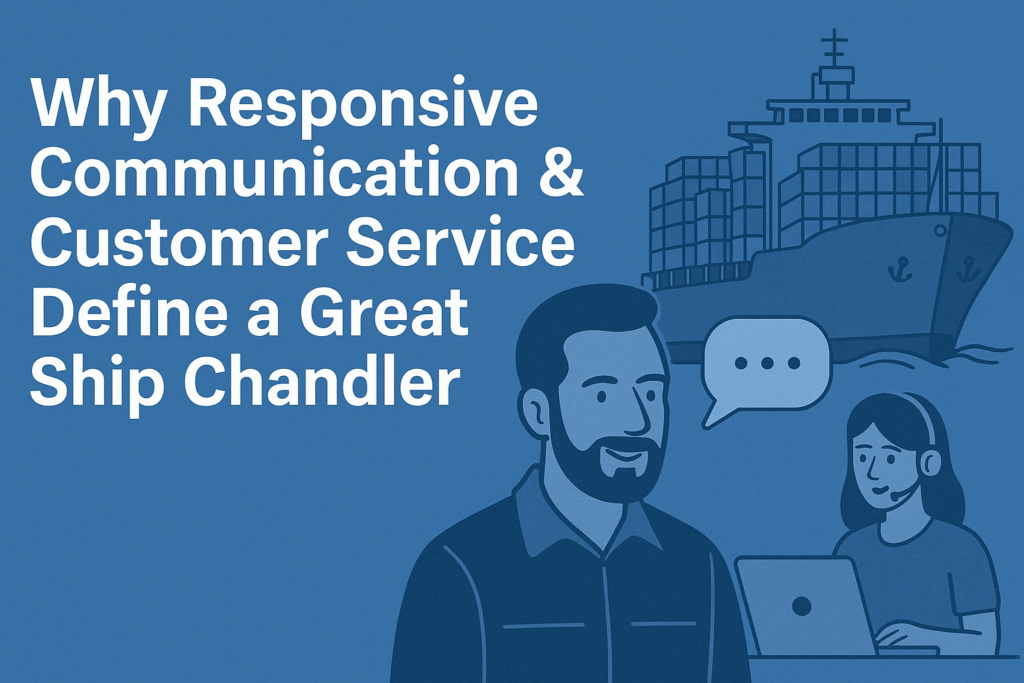Setting the Standard for Seafaring Comfort: Why Cabin Supplies Matter
Life aboard a vessel, whether for a short coastal hop or a months-long transoceanic journey, presents unique challenges and demands. For the dedicated crew operating these vessels, the cabin isn’t just a place to sleep; it’s their sanctuary, their personal space in a demanding environment. Ensuring these spaces are well-equipped, comfortable, and hygienic is not merely a matter of convenience – it’s fundamental to crew morale, well-being, operational efficiency, and safety. Neglecting cabin and accommodation supplies can lead to decreased productivity, increased fatigue, and ultimately, compromise the success of the voyage.
A well-supplied cabin contributes significantly to a positive shipboard environment. It demonstrates care for the crew, aligning with regulations like the Maritime Labour Convention (MLC, 2006), which sets minimum standards for seafarers’ living conditions. Investing in quality cabin supplies is investing in your most valuable asset: your crew.
Beyond the Bunk: Decoding Essential Cabin & Accommodation Supplies
When we talk about cabin supplies, it’s easy to think only of bedding and basic toiletries. However, a truly comfortable and functional living space at sea requires a more comprehensive approach. These supplies form the backbone of daily life onboard, ensuring personal needs are met and shared spaces remain habitable.
Think holistically about the crew’s experience:
- Sleeping Quarters: The core of rest and recuperation.
- Sanitary Facilities: Maintaining hygiene is paramount at sea.
- Linens and Textiles: Comfort, cleanliness, and durability are key.
- Cleaning & Janitorial: Keeping personal and common areas sanitary.
- Personal Amenities: Items that contribute to individual comfort and well-being.
Sourcing these diverse items requires a reliable partner. For vessels operating in the Port of Houston or the wider Gulf Coast region, understanding the full scope of Cabin & Accommodation supplies available from a trusted chandler is the first step towards ensuring crew comfort.
Deep Dive: Bedding and Linens Engineered for the Marine Environment
Sleep quality directly impacts crew alertness and performance. Shipboard bedding faces unique pressures: constant motion, varying humidity levels, and the need for enhanced durability and fire safety compliance (often mandated by SOLAS – Safety of Life at Sea regulations).
H3: Choosing the Right Mattress
Ship mattresses aren’t standard residential mattresses. Key considerations include:
- Durability: Built to withstand constant use and movement.
- Fire Retardancy: Compliance with maritime safety standards is non-negotiable. Look for IMO-certified options.
- Material: Options range from dense foam (good support, less motion transfer) to innerspring (traditional feel, potentially better airflow) and hybrids. Consider resistance to mould and mildew.
- Comfort Level: While subjective, providing a reasonably comfortable mattress boosts morale.
- Size & Fit: Must match the specific bunk dimensions on the vessel.
H3: Linens – More Than Just Thread Count
Sheets, pillowcases, duvet covers, and blankets need to be comfortable, durable, and easy to maintain in a marine setting.
- Material Matters:
- Cotton: Breathable and comfortable but can absorb moisture and take longer to dry.
- Polycotton Blends: Offer a balance of comfort, durability, and faster drying times – often a practical choice for ships.
- Microfiber: Dries quickly, wrinkle-resistant, and durable, but breathability can vary.
- Durability: Look for reinforced stitching and fabrics designed for frequent industrial laundering.
- Hygiene: Choose materials that can withstand high washing temperatures for effective sanitization.
- Quantity: Ensure sufficient sets per crew member to allow for regular changes and laundry cycles (MLC guidelines often specify minimums).
H3: Pillows and Protective Covers
Pillows contribute significantly to sleep quality. Consider hypoallergenic options for crew members with sensitivities. Waterproof or water-resistant mattress and pillow protectors are crucial investments, extending the life of bedding and improving hygiene by guarding against spills, sweat, and allergens.
H4: Quotable List: Key Bedding Selection Factors for Ships
- IMO Fire Retardancy Certification
- Proven Durability for Marine Use
- Resistance to Moisture and Mildew
- Ease of Laundering and Quick Drying Times
- Appropriate Sizing for Bunks
- Availability of Protective Covers
Sanitation & Hygiene: Non-Negotiables for a Healthy Ship
Maintaining high standards of cleanliness in confined living quarters is crucial to prevent the spread of illness and ensure a pleasant living environment. This requires the right supplies and consistent routines.
H3: Cleaning Chemicals and Tools
The choice of cleaning agents should balance effectiveness with safety and environmental considerations (compliance with MARPOL Annex V regarding discharge of cleaning agents).
- Surface Cleaners & Disinfectants: Multi-purpose cleaners for general surfaces, plus dedicated disinfectants for high-touch areas (doorknobs, light switches, bathrooms).
- Bathroom Cleaners: Toilet bowl cleaners, tile/grout cleaners, glass cleaners specifically formulated for removing soap scum and preventing mould.
- Floor Care: Appropriate cleaners for the specific flooring materials used onboard.
- Environmentally Conscious Options: Increasingly available and often preferred, especially those certified as readily biodegradable.
- Essential Tools: High-quality mops, buckets (consider colour-coding for different areas), durable brushes, microfiber cloths (highly effective for cleaning), squeegees, and appropriately powered vacuum cleaners.
H3: Waste Management Essentials
Proper waste disposal is critical for hygiene and environmental compliance.
- Cabin Bins: Appropriately sized bins for each cabin and common area.
- Bin Liners: Strong, correctly sized liners are essential. Consider biodegradable options where appropriate and permitted.
- Segregation: Supplies to support onboard waste segregation policies (e.g., labelled bins).
H3: Personal Hygiene Staples
While seemingly basic, the quality and consistent availability of personal hygiene items significantly impact crew comfort.
- Soaps: Hand soap (liquid or bar), shower gel/body wash. Consider antibacterial options for galleys and washrooms.
- Paper Products: Toilet paper, paper towels. Quality matters – flimsy products are frustrating and inefficient.
- Shampoos & Conditioners: Basic amenities often appreciated by crew.
H4: Comparative Analysis: Standard vs. Eco-Friendly Cleaners
While standard cleaners offer proven efficacy, eco-friendly alternatives present compelling benefits:
| Feature | Standard Cleaners | Eco-Friendly Cleaners |
|---|---|---|
| Environmental Impact | Can contain harsh chemicals, potentially harmful if discharged improperly (MARPOL restricts). | Often biodegradable, plant-derived ingredients, reduced aquatic toxicity. Better MARPOL compliance potential. |
| Crew Safety | May require more stringent PPE (gloves, ventilation) due to harsh fumes or skin irritants. | Generally lower VOCs (Volatile Organic Compounds), less irritating fumes, often safer for skin contact. |
| Effectiveness | Often perceived as stronger, especially for heavy-duty cleaning. | Modern formulations are highly effective for most routine cleaning tasks. Specific tasks may still require targeted standard cleaners. |
| Cost | Can sometimes be cheaper per unit initially. | Price gap is narrowing; concentrated versions can be cost-effective. Consider long-term health/environmental costs. |
Towels, Toiletries, and Personal Touches
Beyond the essentials of sleeping and cleaning, other items contribute significantly to making a cabin feel more like home.
- Towels: Bath towels, hand towels, and face cloths should be provided in sufficient quantities. Key factors are absorbency, durability to withstand frequent washing, and relatively quick drying times. 100% cotton is absorbent but slow-drying; cotton-poly blends offer a compromise.
- Basic Toiletries: While crew often bring their own preferred brands, providing starter items or having basics available (especially if luggage is delayed) is good practice.
- Laundry Supplies: If onboard laundry facilities are available for personal use, providing quality detergent and perhaps fabric softener is essential.
- Minor Amenities: Items like mirrors (fixed securely), hooks for towels or clothes, and potentially curtains or blinds for portholes enhance usability and privacy.
Choosing Your Supply Partner: The Astro Ship Supply Advantage
Sourcing high-quality, compliant, and diverse cabin and accommodation supplies requires a knowledgeable and reliable ship chandler. Timely delivery, consistent product quality, and understanding the specific needs of the maritime industry are paramount.
Why Partnering Matters:
- Quality Assurance: A good supplier vets products for durability, compliance (e.g., fire safety for bedding), and suitability for the marine environment.
- Consolidated Sourcing: Simplifies procurement by providing a single point of contact for a wide range of needs, from linens to cleaning chemicals.
- Logistical Expertise: Ensures supplies reach the vessel on time, navigating port procedures and schedules – crucial for avoiding delays.
- Compliance Knowledge: Understands international regulations (MLC, SOLAS, MARPOL) and local requirements (e.g., U.S. Customs, Texas Department of State Health Services).
At Astro Ship Supply, we pride ourselves on being more than just suppliers; we are partners in your vessel’s operational success. Our commitment involves rigorous quality control across our supply chain, ensuring every item, from bedding to cleaning supplies, meets stringent maritime standards. Partnering with a trusted chandler like Astro Ship Supply ensures access to a full range of quality Cabin & Accommodation supplies, backed by 24/7 support and a deep understanding of the demands of the Houston and Gulf Coast maritime sector. We help you maintain compliance, enhance crew comfort, and keep your operations running smoothly.
H4: Quotable List: Checklist for Selecting a Cabin Supplies Chandler
- Demonstrated experience in the maritime industry.
- Comprehensive range of cabin and accommodation products.
- Verifiable quality control processes.
- Knowledge of relevant maritime regulations (IMO, Flag State, Port State).
- Reliable delivery track record within port areas.
- Availability and responsiveness (e.g., 24/7 support).
- Compliance certifications (e.g., ISO 9001).
- Transparent pricing and invoicing.
Case Study Approach: Tailoring Supplies to the Voyage
The specific needs for cabin supplies can vary significantly depending on the vessel type, voyage duration, and crew size.
H3: Scenario 1: Short Sea Shipping (e.g., Coastal Tanker)
- Duration: Days to a week.
- Crew Size: Relatively small.
- Supply Focus:
- Emphasis on efficient restocking and turnaround.
- Standard durability items likely sufficient.
- Sufficient basic hygiene and cleaning supplies for the duration.
- Fewer sets of linens per person may be needed compared to long voyages.
H3: Scenario 2: Long Haul Voyage (e.g., Transoceanic Container Ship)
- Duration: Weeks to months.
- Crew Size: Larger and more diverse.
- Supply Focus:
- High Durability: All items, especially bedding and towels, must withstand extended use and frequent laundering.
- Bulk Quantities: Sufficient supplies needed for the entire voyage duration, including buffers. Cleaning chemicals often purchased in concentrate.
- Enhanced Comfort: Higher quality mattresses, pillows, and potentially small amenities can significantly impact morale on long trips.
- Robust Hygiene Stocks: Ample reserves of soaps, sanitizers, paper products, and cleaning agents are critical.
- Laundry Capacity: Ensure enough linens/towels to match onboard laundry capabilities and recommended change frequencies (e.g., weekly linen changes minimum).
Understanding these different requirements allows for more effective and cost-efficient provisioning, ensuring the crew has what they need, when they need it, regardless of the journey ahead.
Your Questions Answered: Cabin & Accommodation Supply FAQs
What are the absolute essential cabin supplies for any vessel?
At a minimum, every crew member requires appropriate bedding (mattress, pillow, sufficient linens), basic towels, essential toiletries (soap, toilet paper), adequate lighting, secure storage for personal effects, and access to sanitary facilities stocked with cleaning supplies. Compliance with MLC 2006 provides a detailed baseline standard. See relevant MLC guidelines for specifics.
How often should ship linens and towels be changed?
While specific company policies may vary slightly, general maritime practice and MLC recommendations suggest changing bed linens at least once per week. Towels should ideally be changed more frequently, perhaps twice weekly or as needed, to maintain hygiene. Sufficient stock must be carried to accommodate this schedule and laundry turnaround times.
What makes ‘marine grade’ bedding different from regular bedding?
Marine grade bedding, particularly mattresses and sometimes pillows/duvets, must often meet specific fire retardancy standards set by the International Maritime Organization (IMO). They are also typically designed for enhanced durability, resistance to moisture/mildew prevalent in marine environments, and may have features suited to constant use and movement on board a ship.
Are there specific regulations concerning cleaning supplies used on ships?
Yes, primarily environmental regulations under MARPOL Annex V, which governs the disposal of garbage, including cleaning agents and residues, into the sea. Many ports also have local restrictions. Choosing effective yet environmentally friendlier options, and ensuring proper storage and handling according to Safety Data Sheets (SDS), is crucial for compliance. Using concentrates can also reduce packaging waste.
How can we ensure hygiene supplies are effective against potential onboard illnesses?
Effectiveness relies on using appropriate products correctly. Ensure disinfectants are rated for efficacy against relevant viruses and bacteria. Provide clear instructions and training for cleaning crew on dilution rates (if applicable) and contact times needed for disinfection. Promote regular handwashing with suitable soap and provide hand sanitizers, especially in common areas and near food preparation zones. Consistent cleaning schedules for high-touch surfaces are vital.
Conclusion: Prioritizing Comfort for Peak Performance at Sea
Equipping a vessel’s cabins and accommodation areas is far more than a logistical task; it’s a critical investment in crew welfare and operational integrity. From the fire-retardant mattress ensuring safe rest to the quality cleaning supplies maintaining a healthy environment, every item plays a role. By understanding the specific needs of the marine environment, considering the demands of different voyage types, and partnering with a reliable, quality-focused ship chandler, vessel operators can ensure their crews have the comfortable, safe, and well-maintained living spaces they deserve. This commitment fosters morale, enhances efficiency, ensures compliance, and ultimately contributes to the overall success of every voyage.






